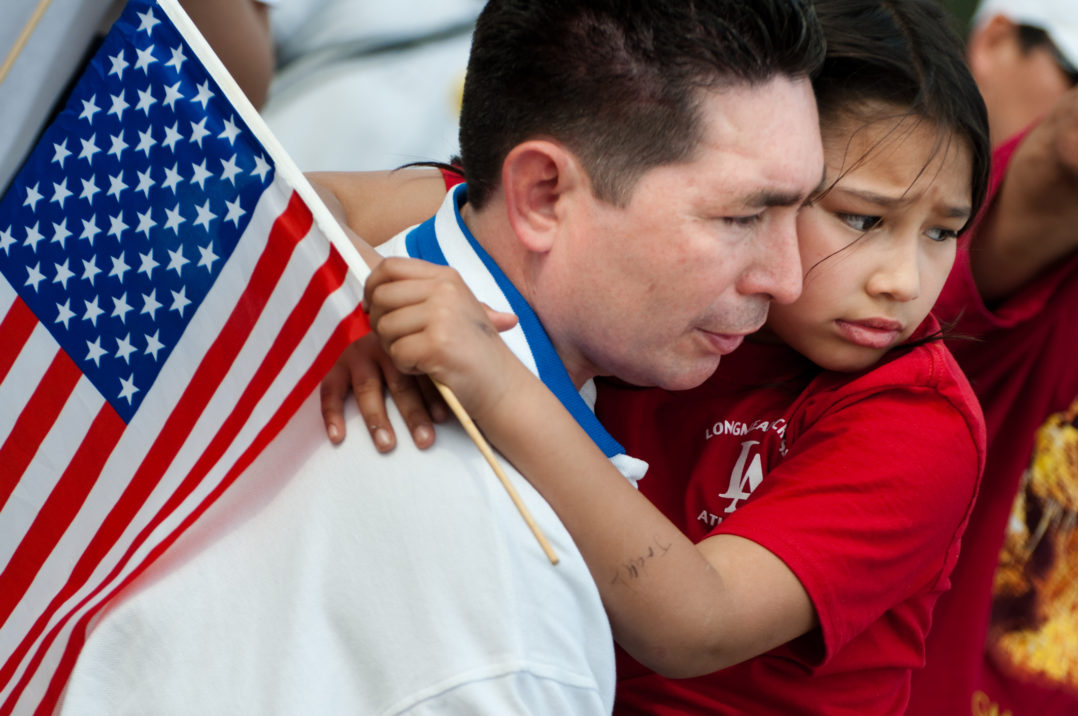These leaders are lifting up our immigrant community
By Stephanie Presch, Content Specialist, UnidosUS and Laura Vasquez, Associate Director, Immigrant Integration, UnidosUS
Community Profiles: Redefining Leadership for Stronger Communities
During the COVID-19 pandemic, UnidosUS has compiled stories that uplift our community’s resiliency and power that bring the Latino community forward. With the help of the Robert Wood Johnson Foundation, UnidosUS launched the series “Community Profiles: Redefining Leadership for Stronger Communities,” as a commitment to highlight leaders’ support systems, their collective strengths, and collaborative efforts that shape a more accurate narrative of Latinos as positive contributors to the United States and vital to the nation’s health and well-being. This is the sixth blog in our series.
In July 2021, UnidosUS published The Latino Community in the Time of COVID-19: Prospects for an Equitable Recovery One Year Later, laying out the impact that the COVID-19 pandemic has had on the Latino community and what is needed for a true economic and health recovery.
While roughly 70% of Latino workers are “essential,” this number rises to 80% among undocumented workers. Despite the admiration that Americans had for essential workers in the early days of the pandemic, the pathway to citizenship that 60% of Americans had supported for essential workers in May 2020 has not materialized. Instead, immigration reform has faced an uphill battle in the Senate as part of the Build Back Better Act.
Even though Congress has not passed immigration reform, throughout the UnidosUS Affiliate Network there are nearly 50 Affiliates providing immigration legal services and helping community members navigate our current immigration laws and preparing to respond to policy changes that congress or the administration may make in the future. Many of these programs are led by accredited representatives who are non-attorneys trained to offer immigration application assistance. The U.S. Department of Justice adjudicates applications for accredited representatives and describes their role this way: “These representatives are accredited through the Recognition and Accreditation (R&A) Program, which aims to increase the availability of competent immigration legal representation for low-income and indigent persons, thereby promoting the effective and efficient administration of justice.” UnidosUS advocates for the R&A program to adjudicate applications fairly and efficiently to build more capacity for high-quality, low-cost immigration legal services that are needed to meet the demand.

Susy Contreras, is an accredited representative and the Community Development Director at the Mexican American Opportunities Foundation (MAOF), an UnidosUS Affiliate in California, who works every day to support her community, managing MAOF’s Community Financial Capability Programs, as well as MAOF’s health and immigration services.
Susy noted that many in her community only have access to low-paying jobs, with few, if any benefits and due to the pandemic, some faced unemployment which led to a lack of basic needs such as food and secured housing.
“Even before the COVID-19 pandemic the possibility of unemployment was always something community members feared since they knew that the jobs they had were usually the first to go when things got tough,” Susy explained.
Regardless of the challenges, Susy pointed out that there is a keen sense of resiliency among community members she serves every day. “They show up every day and do what is required of them or required for their family. They only know how to move forward, and it seems that nothing will stop them. Their work ethic and commitment to family are undeniable,” Susy stated.

Jacqueline Gonzalez-Vega, is also an accredited representative and the Program Manager for Immigration Programs at UnidosUS Affiliate Redlands Christian Migrant Association (RCMA). She has also seen similar struggles among immigrant community members of Mulberry, Florida.
There are many migrant farmworkers in her community, and despite being essential workers, are paid low wages for their difficult work.
Jacqueline explained, “Both migrant and seasonal farmworkers and their livelihood is often dependent on the whims of mother nature. For example, although rain is important and necessary for fruits and vegetables to grow, farmworkers don’t get paid on rainy days because they can’t work.”
As a result, even if families don’t have to move to follow the harvest, people still struggle, unaware of their rights at work or elsewhere.
Undocumented parents often have U.S. citizen children, and there can be a lot of fear and confusion for families over whether they are eligible for certain benefits. Accredited representatives are well-positioned to advise mixed-status families and to conduct immigration screenings to see how changing immigration policies affect families.
“They are constantly in need of being educated and informed of their rights and oftentimes require additional support in order for them to request or insist on their rights,” she said.
In addition to assisting eligible immigrants apply for U.S. citizenship, part of Susy’s work at MAOF includes helping eligible immigrants access public benefits, but even she has noticed that: “In many cases, there is lack of financial literacy of/for things such as rental/lease agreements, filing/paying taxes, or fair pay/compensation.”
Making sure that parents understand the benefits available to them can be difficult, but necessary, for our community to flourish. For example, the Child Tax Credit is poised to cut Latino child poverty by 39%—but only if everyone who is eligible signs up to receive it, including undocumented parents for their documented children.
Both MAOF and RCMA have also worked with UnidosUS in some capacity as they responded to the COVID-19 pandemic in their communities.
Susy noted that she started her role at MAOF toward the beginning of the pandemic. “With so much going on at the time, my only option was to roll up my sleeves, focus and prioritize what our communities needed most, and do both the hands on and leadership work required.”
MAOF, for example, received leadership and information from UnidosUS that was key as MAOF worked with the press and distributed flyers to get the word out about COVID-19 testing and vaccines in their community.
At RCMA, UnidosUS provided funding for citizenship services events, where RCMA helped eligible permanent residents with their citizenship applications.
Jacqueline started working at RCMA right before the pandemic and noted that her biggest accomplishment—like Susy—has been the confidence to roll up her sleeves and get the job done while putting the needs of the community first.
Both Susy and Jacqueline are emblematic of purpose-driven leaders and use their drive to help members of their community every day. Part of their journey has been completing and maintaining the rigorous training needed to become accredited representatives who can assist immigrants in their own language and with cultural competence. They have stepped up to be able to fill a critical need in their communities and to be able to provide assistance that can have a transformative effect on people’s lives. Susy reflected on her role, saying, “I look to Latina leaders/executives for inspiration and mentorship. It is very powerful to see Latinas in those roles now knowing that they have stories or trajectories similar to mine.”
“Ever since I can remember, my parents always believed in me. I also had teachers in elementary school and high school wo did as well. They would always ask/say; “do you know how much potential you have to do anything you want?’ It was very comforting and encouraging to know that people had my back. I think it made all the difference,” Jacqueline explained.
